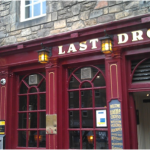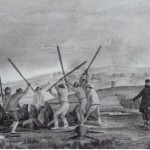Carceral Archipelago
Subscribe
Posted by Christian De Vito in Carceral Archipelago on September 21, 2015

The Carceral Archipelago conference, held in Leicester from 13 to 16 September 2015, felt just like reading over thirty outstanding monographs in two-and-a-half days, getting to know their authors personally, and having the chance to reflect collectively about their mutual entanglements. It was an intense marathon through the burgeoning field of the global history of […]
Posted in Africa, Australia, Bermuda, Carceral Archipelago, Comparison, Conference, Connections, Convict labour, Convicts, Death, Escape, Global History, Heritage, Indigenous people, Japan, Latin America, Methodology, Migration, Penal Colonies, Philippines, Political prisoners, Portugal, Presidios, Prisons, Punishment, Rottnest Island, Russia, Sakhalin Island, Slavery, Spanish America, University of Leicester
Posted by Clare Anderson in Carceral Archipelago on September 10, 2015

By Kristin O’Brassill-Kulfan. Over the past two years, I’ve been welcomed as an affiliated researcher by the CArchipelago team with the tangible benefit of having learned more about both convict history and global history in this brief span of time than in a lifetime previous. My own work is less internationally defined than the avenues the […]
Posted in Carceral Archipelago, University of Leicester, USA | Tagged Carceral Archipelago, University of Leicester
Posted by Clare Anderson in Carceral Archipelago on July 27, 2015

In previous blogs, I have explored some of the circulations and connections that linked nations, colonies and empires, and wove together practices of punishment and penal labour across polities and imperial spaces. This included the sharing of official reports, the spread and adaptation of particular modes of convict punishment, and the intra-colonial mobility of personnel […]
Posted in Andaman Islands, Australia, Brazil, Carceral Archipelago, French Guiana, Global History, Mazaruni, Penal Colonies, Robben Island, University of Leicester | Tagged Carceral Archipelago, Convicts, Global history, Penal colonies, University of Leicester
Posted by Emma Battell Lowman in Carceral Archipelago on July 16, 2015
In June I attended a research seminar at which Professor Joanna Story, Principal Investigator of the Leverhulme Trust funded project, The Impact of Diasporas on the Making of Britain: Evidence, memories, inventions, and Professor Sarah Tarlow, Principal Investigator of Harnessing the Power of the Criminal Corpse project funded by the Wellcome Trust, spoke about […]
Posted in Uncategorized |
Posted by Carrie Crockett in Carceral Archipelago on July 1, 2015

My recent discovery of Alexander Sochaczewski’s painting, Farewell to Europe!, in the Museum Pawilon-X in Warsaw compelled me to think anew about the experience of political exile and about the innate “wordlessness” that the state intended it to symbolize. Although Sochaczewski never sold a single painting during his life, today his work is viewed by thousands of visitors who […]
Posted in Carceral Archipelago, Convict labour, Convicts, Political prisoners, Prisons, Punishment, Russia, Uncategorized
Posted by Emma Battell Lowman in Carceral Archipelago on June 23, 2015

In April 2015 I presented a paper at a conference held at the University of Leicester entitled ‘When is Death?’ The conference was organised by members of the Wellcome Trust funded project, Harnessing the Power of the Criminal Corpse. My PhD has been conducted as part of this project. The conference sought to investigate the […]
Posted in Carceral Archipelago, Conference, Death, Punishment, Social Death, University of Leicester
Posted by Katy Roscoe in Carceral Archipelago on June 8, 2015

A few weeks ago the Carceral Archipelago team of postgraduates presented at the University of Leicester’s annual postgraduate conference. The theme of the Carceral Archipelago panel was “Convicts, Indigenous People and Labour”. The project’s three postgraduate students – Kellie Moss, Katy Roscoe and Carrie Crockett – presented three papers that ranged from Western Australia to […]
Posted in Carceral Archipelago, Conference, Convict labour, Indigenous people, Postgraduates, Rottnest Island, Russia | Tagged Australia, Carceral Archipelago, Postgraduate, Rottnest Island, University of Leicester
Posted by Christian De Vito in Carceral Archipelago on May 26, 2015

Addressing convict transportation –the key feature in the Carceral Archipelago project – implies multi-sited research, that is, research in archives located in different places (and countries/continents). Indeed, as convicts were transported from site to site within and beyond the borders of empires and nation-states, they left traces in official records presently held in repositories across […]
Posted in Carceral Archipelago, Convict labour, Convicts, Global History, Heritage, Methodology, Penal Colonies, Spanish America, Spanish Empire |
Posted by Clare Anderson in Carceral Archipelago on May 3, 2015

In a previous blog, I wrote on the theme of the politics of comparison, of the connected history of circulation and mobility that underpins the CArchipelago project team’s approach to the historiography, theory and archive of penal colonies. Research associate Christian De Vito has since expanded the discussion, discussing the basis of various approaches […]
Posted in Carceral Archipelago, Comparison, Connections, Convicts, Escape, Global History, Methodology, Penal Colonies, Spanish Empire, University of Leicester | Tagged Carceral Archipelago, Convicts, Global history, Penal colonies, University of Leicester
Posted by Emma Battell Lowman in Carceral Archipelago on April 22, 2015
In the year since I joined The Carceral Archipelago, it has been a pleasure to support the novel and extensive research being conducted by the project’s members. Our team is conducting research on and about five continents over as many centuries and making exciting connections and discoveries in archives, at heritage sites, and in fruitful […]
Posted in Carceral Archipelago, Conference, Connections, Global History, University of Leicester | Tagged Carceral Archipelago, Conference, Global history, University of Leicester |










Recent Comments